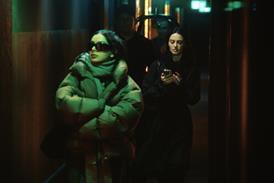Dir: Pablo Larrain. Chile-Brazil. 2008. 98mins .

Chile’s darkest days coincide with the golden age of disco in Tony Manero, a disturbing character study with a trenchant edge of social satire. Director Pablo Larrain follows his 2006 debut Fuga with a film that works on at least three levels: notably, as the study of a warped loner, as a comment on fan fetishism, and as a portrait of Chile’s national traumas under the Pinochet dictatorship.
A gritty but sometimes elusively narrated drama, Tony Manero will become a fixture on the festival circuit, but commercial chances will be selective outside the Spanish-language art-house market. Niche distributors should warm to it, although they may have to stress either the disco-fever element or the dark crime content to make the film a plausible sell to audiences.
Tony Manero is set in Santiago in 1978, when Chile is under the sway of Pinochet’s regime. Co-screenwriter Castro - famous in Chile as a stage actor and director - plays Raul Peralta, a 52-year-old man obsessed, like many at the time, with the film Saturday Night Fever. A wannabe John Travolta, Raul is first seen signing on for a TV show’s search for a homegrown Tony Manero - the dancefloor dandy played by Travolta in that film.
The unprepossessing, ungainly-seeming Raul models himself on Tony, and leads a small troupe that performs disco routines in a run-down cafe. Other members are are his girlfriend, faded belle Cony (Noguera), her teenage daughter Paul i (Lattus), and a younger man, Goyo (Morales), with apparent left-wing leanings and some sleek dance moves.
While striving to perfect his routines, Raul pursues his latest fixation, the purchase of a large quantity of glass to recreate the famous dancefloors of the Travolta film. But unknown to his dance mates, the usually placid Raul is even more disturbed than his rages in rehearsal suggest. Early on, he helps an old lady in distress, then without warning turns violent. Going to the cinema to see Saturday Night Fever yet again, he finds Grease playing instead and vents his fury to shocking effect. Just as troubling is the rather more petty way in
which he decides to settle a score with a competitor.
Tony Manero confidently persuades us to accept certain wilful contradictions in its central character sketch. Raul is a wildly unprepossessing figure, sallow and rat-like, yet he seems to have a strange sexual appeal. Both Cony and elderly cafe owner Wilma (Poblete) find him irresistible, though he offers little in return, while even Paul i seems susceptible to him, as shown in a sequence that lowers Raul a few more steps on the ladder of humanity.
Meanwhile, the political background is introduced discreetly and gradually, with army forces glimpsed menacingly in the background. An early hint of an extreme-right status quo is Wilma’s complaint that Goyo’s plea for unity in the troupe sounds downright communistic.
Blind to the reality around him, Raul fixedly pursues his dream - which is eventually shown to be one of surpassing futility. Without making their political point explicit, Larrain and his co-writers offer a suggestive commentary on the way that societies retreat into fantasy and denial in times of repression. Faded colour and loose docu-flavoured camerawork heighten our sense of the drabness that Raul hopes to escape from. What’s more, Larrain pulls off the rare achievement of evoking the disco era without a shred of the customary kitsch.
Production companies
Fabula
Prodigital
International sales
Funny Balloons
(33) 1 40 13 05 84
Producers
Juan de Dios Larrain
Screen play
Pablo Larrain
Alfredo Castro
Mateo Iribarren
Cinematography
Sergio Armstrong
Production design
Polin Garbisu
Editor
Andrea Chignoli
Main cast
Alfredo Castro
Amparo Noguera
Hector Morales
Paola Lattus
Elsa Poblete




















No comments yet